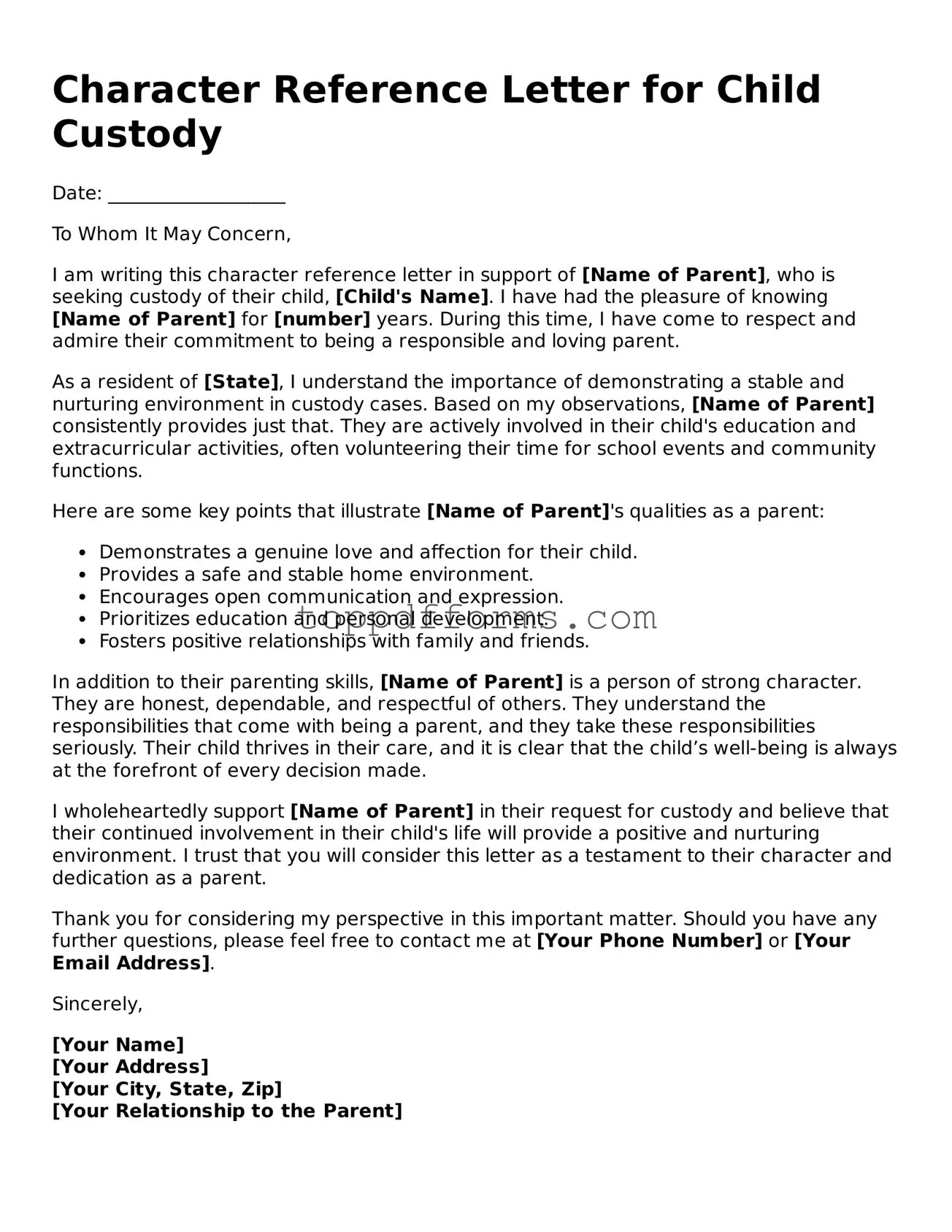Free Character Reference Letter for Child Custody Template
Things You Should Know About This Form
What is a Character Reference Letter for Child Custody?
A Character Reference Letter for Child Custody is a document that provides insight into a parent's character and parenting abilities. This letter is typically written by someone who knows the parent well, such as a family member, friend, teacher, or community leader. The purpose of the letter is to support the parent’s case in custody proceedings by highlighting their positive qualities, parenting skills, and the impact they have on their child’s life.
Who should write a Character Reference Letter?
Anyone who has a close relationship with the parent and can speak to their character and parenting abilities can write a Character Reference Letter. This could include friends, relatives, teachers, coaches, or even neighbors. It’s essential that the writer knows the parent well enough to provide specific examples of their parenting style and the positive influence they have on their child. The more personal and detailed the letter, the more impactful it will be in court.
What should be included in the letter?
The letter should start with a brief introduction of the writer, including their relationship to the parent and how long they have known them. Next, it should include specific examples of the parent's positive qualities, such as their responsibility, nurturing nature, and commitment to their child’s well-being. The writer might also mention any relevant experiences, such as how the parent handles challenges or supports their child’s education and interests. Finally, the letter should conclude with a strong statement of support for the parent’s custody request.
How can a Character Reference Letter impact a custody case?
A well-written Character Reference Letter can significantly influence a custody case by providing the court with a broader perspective on the parent’s capabilities and character. Judges often consider the opinions of those who know the parent well, as these insights can help them understand the parent-child relationship better. A positive letter can reinforce the parent’s case, showcasing their dedication and love for their child, and may ultimately help in achieving a favorable custody arrangement.
PDF Overview
| Fact Name | Description |
|---|---|
| Purpose | A Character Reference Letter for Child Custody supports a parent's case by providing insights into their character and parenting abilities. |
| Format | The letter should be written in a formal format, including the writer's contact information, date, and a clear introduction. |
| Content | It should include specific examples of the parent's positive qualities, interactions with the child, and any relevant experiences. |
| Length | A good character reference letter is usually one to two pages long, providing enough detail without being overly lengthy. |
| State-Specific Forms | Some states may have specific guidelines for character reference letters, such as California Family Code Section 3011. |
| Submission | The letter must be submitted to the court as part of the custody case documentation, often included with other supporting materials. |
| Impact | A well-written letter can significantly influence the court's decision by providing a personal perspective on the parent's suitability. |
Common mistakes
Filling out a Character Reference Letter for Child Custody can be a daunting task. Many individuals make common mistakes that can negatively impact the outcome of the custody case. One frequent error is failing to provide specific examples of the parent’s behavior and character. Instead of vague statements, details about the parent's interactions with the child can paint a clearer picture of their parenting style.
Another mistake is overlooking the importance of objectivity. The letter should remain impartial and focus on the facts rather than emotional appeals. A reference that appears biased may be dismissed by the court. Maintaining a neutral tone and presenting observations without personal feelings is essential.
Additionally, people often neglect to include their relationship with the parent in question. The court needs to understand the context of the reference. Stating how long the writer has known the parent and in what capacity can lend credibility to the letter. Without this context, the reference may lack weight.
Some individuals also forget to proofread their letters. Spelling and grammatical errors can undermine the professionalism of the document. A well-written letter reflects the seriousness of the matter and shows respect for the court's time.
Another common oversight is failing to sign and date the letter. A signature adds authenticity, while a date provides context for the reference. Without these elements, the letter may be considered incomplete or less credible.
Moreover, using overly complex language can confuse the reader. Clarity is vital. Simple and straightforward language helps convey the message effectively. Avoiding jargon ensures that the letter is accessible to everyone involved in the case.
Finally, some people forget to tailor the letter to the specific situation. Each custody case is unique, and a generic letter may not address the specific needs of the child or the circumstances of the custody arrangement. Customizing the letter to reflect the individual situation can significantly enhance its impact.
Different Types of Character Reference Letter for Child Custody Templates:
Nursing Letter of Recommendation - Possesses a profound understanding of medical procedures and patient care protocols.
A Character Letter for Court is a crucial document that offers judges insight into the character and personality of an individual involved in legal matters. By providing a personal reflection on the individual's actions and ethical standpoint, this letter plays a significant role in shaping the court's understanding of their true nature. If you wish to express your support, you can complete the Character Letter for Court form to formally convey your perspective.
Immigration Recommendation Letter Template - Details the applicant's involvement in professional organizations and networks.
